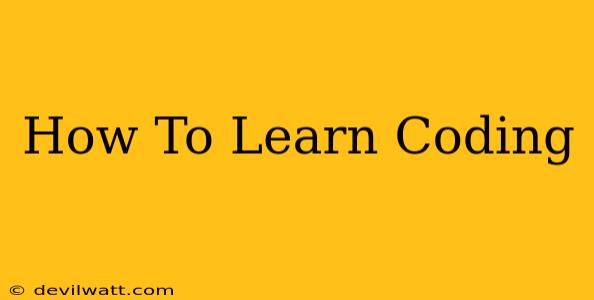So, you want to learn to code? That's fantastic! Coding is a valuable skill in today's digital world, opening doors to exciting careers and creative projects. But where do you start? This comprehensive guide will walk you through the process, providing actionable steps and resources to help you on your coding journey.
Choosing Your First Programming Language
The sheer number of programming languages can feel overwhelming. Don't worry, you don't need to learn them all! Start with one that suits your interests and goals. Here are a few popular choices for beginners:
-
Python: Known for its readability and versatility, Python is excellent for beginners and is widely used in data science, web development, and scripting. Its large community provides ample support and resources.
-
JavaScript: Essential for web development, JavaScript allows you to create interactive websites and web applications. It's a client-side language, meaning it runs directly in the user's web browser.
-
HTML/CSS: While not strictly programming languages, HTML (HyperText Markup Language) and CSS (Cascading Style Sheets) are foundational for web development. HTML structures the content of a webpage, while CSS styles its appearance. Learning these is a great first step towards front-end web development.
-
Java: A robust and widely used language, Java is suitable for building large-scale applications and Android apps. It has a steeper learning curve than Python but offers significant career opportunities.
Which language should you choose?
Consider your interests:
- Interested in websites? Start with HTML, CSS, and JavaScript.
- Drawn to data analysis? Python is a great choice.
- Want to build mobile apps? Explore Java (for Android) or Swift (for iOS).
Effective Learning Strategies:
Learning to code is a journey, not a race. Consistency and the right approach are key. Here are some proven strategies:
1. Interactive Learning Platforms:
Websites like Codecademy, freeCodeCamp, Khan Academy, and Codewars offer interactive coding courses and exercises, making learning fun and engaging. These platforms provide immediate feedback and allow you to practice what you learn.
2. Online Courses:
Platforms like Coursera, edX, and Udemy offer a wide range of coding courses, from beginner to advanced levels. Many offer certificates upon completion, boosting your resume.
3. Books:
While online resources are abundant, don't underestimate the value of a good coding book. They often provide a more structured and in-depth learning experience.
4. Practice, Practice, Practice:
The most crucial aspect of learning to code is consistent practice. Work on small projects, even if they seem simple. The more you code, the more confident and proficient you'll become.
5. Join a Community:
Connect with other learners and experienced programmers. Online forums, coding communities (like Stack Overflow), and local meetups provide support, guidance, and opportunities for collaboration.
Building Your First Projects:
Once you grasp the basics, start working on small projects to solidify your knowledge and build your portfolio. Here are some project ideas:
- A simple calculator: Practice basic arithmetic operations and user input.
- A to-do list app: Learn about data structures and user interfaces.
- A basic website: Apply your HTML, CSS, and JavaScript skills.
Staying Motivated:
Learning to code can be challenging. To stay motivated:
- Set realistic goals: Don't try to learn everything at once. Focus on small, achievable milestones.
- Celebrate your progress: Acknowledge your accomplishments, no matter how small.
- Find a coding buddy: Learning with a friend can make the process more enjoyable and keep you accountable.
- Don't be afraid to ask for help: The coding community is generally very supportive.
Learning to code takes time and effort, but the rewards are immense. By following these steps and staying persistent, you can successfully embark on your coding journey and unlock a world of opportunities. Good luck!

